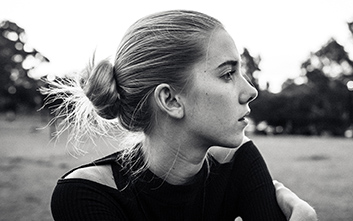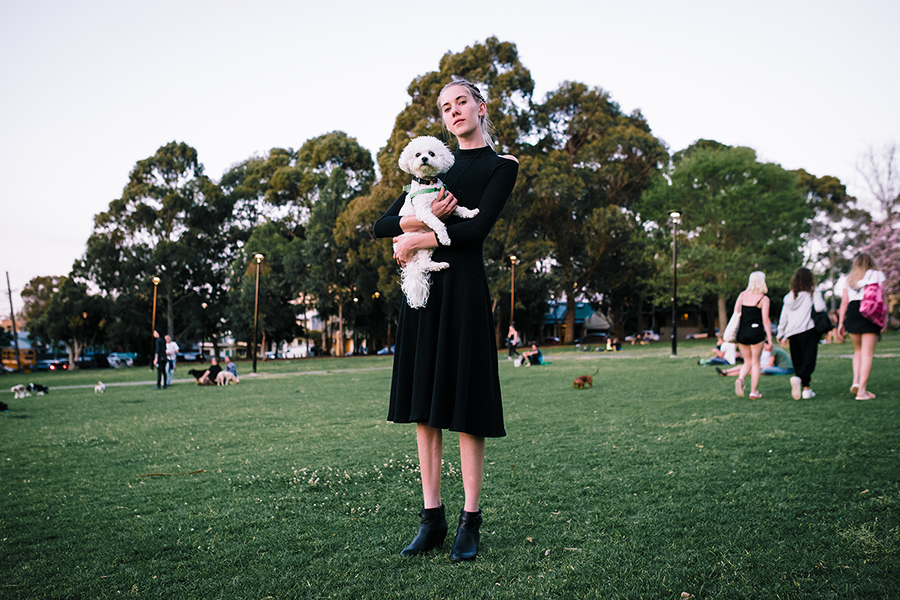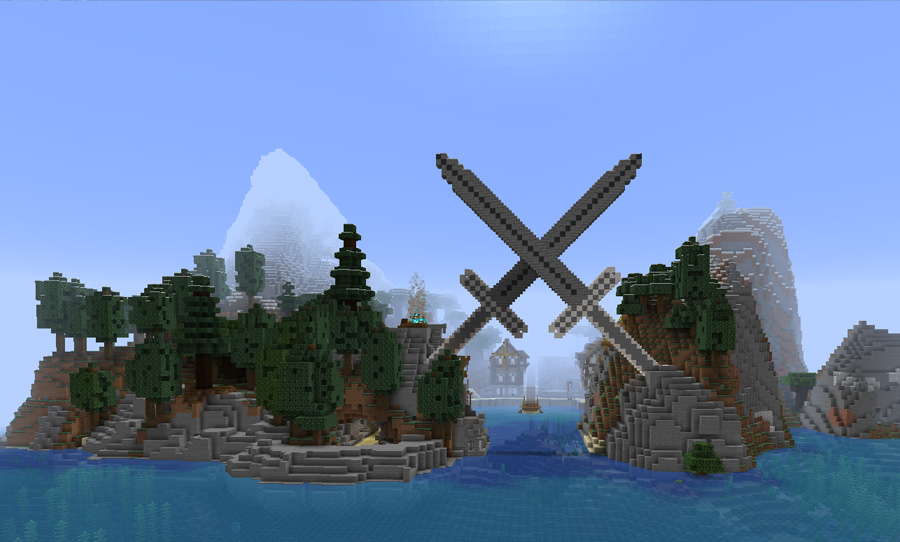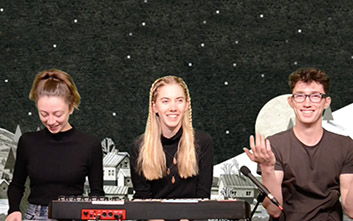Since dropping her single The Thaw, Woodes aka Elle Graham has gone worldwide. Picking up attention from some of the biggest tastemakers, blogs and celebrities all over the planet, her career has rocketed skywards in spectacular fashion over the last few years.
She’s been fully booked in recent times, to say the least. That being said, she’s squeezed in enough time to put the finishing touches on a debut EP, as well as have a quick chat to us at Happy. After a quick walk through Camperdown Park and getting a little distracted by the dogs there, we sat down together.
With even Norway listening to Woodes, maybe it’s time you started. We pick her brain about learning the fine art of production, and getting a little experimental.
HAPPY: Thanks for coming, how are you going?
WOODES: I’m good, yeah!
HAPPY: Starting with the obvious, how’s the EP going?
WOODES: It’s good, it’s done. I’ve put all of the mastered files into Dropbox today. I had a very big Dropbox afternoon. The artwork’s done, it’s finally finished.
HAPPY: Nothing beats a well sorted Dropbox. So coming away from the two singles we’ve already heard, are there going to be some less than expected sounds on the rest of the EP?
WOODES: I suppose there’s some more experimental electronic stuff on it, there’s also a quieter track that is called Byron, it’s really nice and subversive, and there’s one about bonfires. It’s kind of like a little journey in itself but I do suppose it’s all a…similar vein. There’s nothing too unexpected, I would think?
HAPPY: Byron inspired by Byron Bay?
WOODES: Yeah!
HAPPY: Very nice, there’s heaps of good stuff coming out of Byron at the moment.
WOODES: It’s such a nice place, every time I’m there I want to write some music. Or stay for a longer time, it’s just so peaceful.
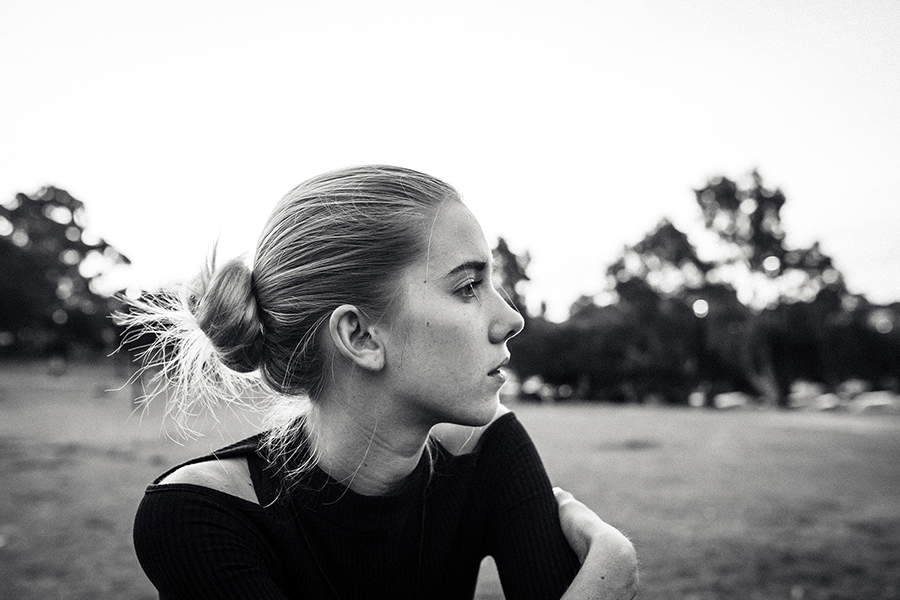
HAPPY: Now you produced the EP yourself, didn’t you?
WOODES: Well I worked with some friends. It was one of those things – they’re all my own songs, and I do all of the co-production on them, but I also do work with friends because I feel like it brings the EP to such a special place.
HAPPY: Where did you learn to produce?
WOODES: I used to record music up with my now-housemate in Townsville. He showed me a bit in Logic when we were recording, when we were teenagers, mainly just piano and singing. Then when I came down to Melbourne at VCA I had to record demos every week to present to the class.
I thought I would always be able to rope in [my housemate] or some other people I knew who could record me and it just became evident that if I wanted to have that control, to have the idea from the start to a finished place, then I had to build that portfolio of skills. So I stripped everything I was doing off the internet and I didn’t really do any shows for a number of years, and just focused on producing.
That was really good for me, because I didn’t really know if I wanted to do performance or what other avenue of music I wanted to do, but out of it I just became fascinated by production and curious about the new possibilities. With singing, and voice, I didn’t think about all the things you could place in the atmosphere or how I could stack my own voice into a big choir, and now it’s one of my favourite things to do. Just sit in my room and ‘ooh’ to myself.
HAPPY: VCA? Victorian College of the Arts?
WOODES: Yeah.
HAPPY: And you thought that was a valuable course?
WOODES: It was really good, we were the first year through that course so they threw a lot of stuff at us as guinea pigs. It meant that the course was very demanding, like we did a lot of the jazz components that the performance kids do. There’s no jazz in Townsville, or there’s a little bit, but it’s not the same way that Melbourne does it.
So going to one of the top jazz universities in Australia and learning all of that theory was horrible, but it put me in a really great harmonic state. It trained my ears really well, so when I’m in writing sessions with other people I can pick up chord progressions and things like that. You can be on par with other musicians.
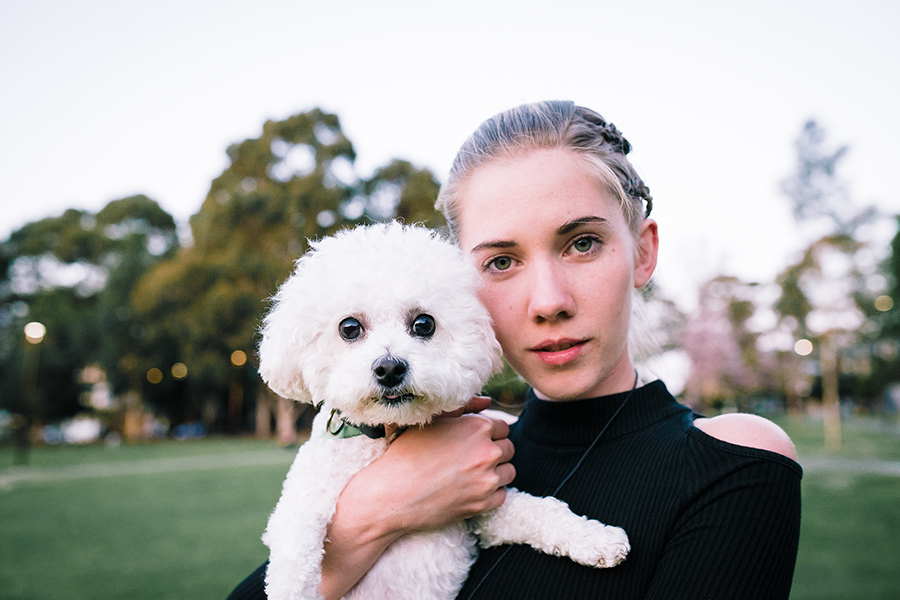
HAPPY: There’s been ads popping up everywhere for production courses, and they’re all new. I have to say I’ve doubted the validity of some of those so it’s nice to hear that it was a success.
WOODES: Well it wasn’t just a production course. You needed something else, a video or a dance…a reason you were making that piece of music. You could record it as a voice memo, you could bring the class into a hallway to sit and mumble. Very ‘arts degree’ – you don’t have to produce but a lot of us found that it was a good time to learn. It also developed a friendship base.
HAPPY: You do have a pretty huge history of collaborations, you sort of touched on it earlier but what do you value so much about collaborating with other artists?
WOODES: I think I’ve always been collaborating with my friends. Even when you’re a teenager and there’s a guitar in the room and everyone’s throwing around ideas…I find, as opposed to it being work, it’s a really nice way of meeting people and spending time together. Now I get to meet artists that I look up to, or writers that I look up to and I get to write with them which is the best bit. Making new friends, it’s kind of cheesy but I like it. I also walk away from collaborations with a list of new plugins to get, a bunch of new techniques that I hadn’t thought of and similarly they walk out with a fresh perspective on something I’ve given them.
HAPPY: So it’s about expanding your knowledge base.
WOODES: Yeah! A lot of the people I’ve collaborated with are now my dear friends, and you keep showing them your demos. It’s a really nice community to have all these ears listening in and helping out.
[soundcloud url=”https://api.soundcloud.com/playlists/138742280″ params=”color=000000&auto_play=false&hide_related=false&show_comments=true&show_user=true&show_reposts=false” width=”100%” height=”450″ iframe=”true” /]
HAPPY: A lot of those early collabs were electronic, like Elkkle and Golden Vessel, and you mentioned there’s some experimental electronic stuff on the EP. What draws you into that style of music?
WOODES: Daggers & Knives touches on it a bit, percussively. For me a big turning point was when I first heard James Blake’s Limit To Your Love. It was my first moment of ‘I want to produce something like that’, where there’s amazing bass, a really strong beat or jarring beats with soulful vocals. I find it has a wider audience base, it’s not like this wacky or strange electronic music, it has a wide community. That was my first moment of ‘I want to make beats.’
HAPPY: You mentioned James Blake, but in that realm who are the other artists that are either influences into your more experimental tunes, or people you dream of working with?
WOODES: I love Jon Hopkins, he’s one of my favourite producers on the planet. I found him through Coldplay’s Vida La Vida, cause he did a bunch of the production on that. It’s some of the most beautiful music. He also worked with Imogen Heap, who’s one of my other big influences. I really love FKA Twigs, I think she’s a very unique pop/electronic artist. Björk and Sigur Rós are amazing. I’m drawn to electronic artists that maybe for their first couple of years were doing something quite strange but then all of a sudden they’ve shaped up.
HAPPY: James Blake being the prime example.
WOODES: Yeah, James Blake! There would have been people turning up to his gigs like ‘what is this, I’m so confused’. Now, there’s just this fleet of producers that just want to be him. He’s just set his own thing up, they’re my favourite type of artists, those people. Even Jon Hopkins – where would you place it? Then all of a sudden he’s playing these euphoric sets at festivals and in clubs. Really cool.
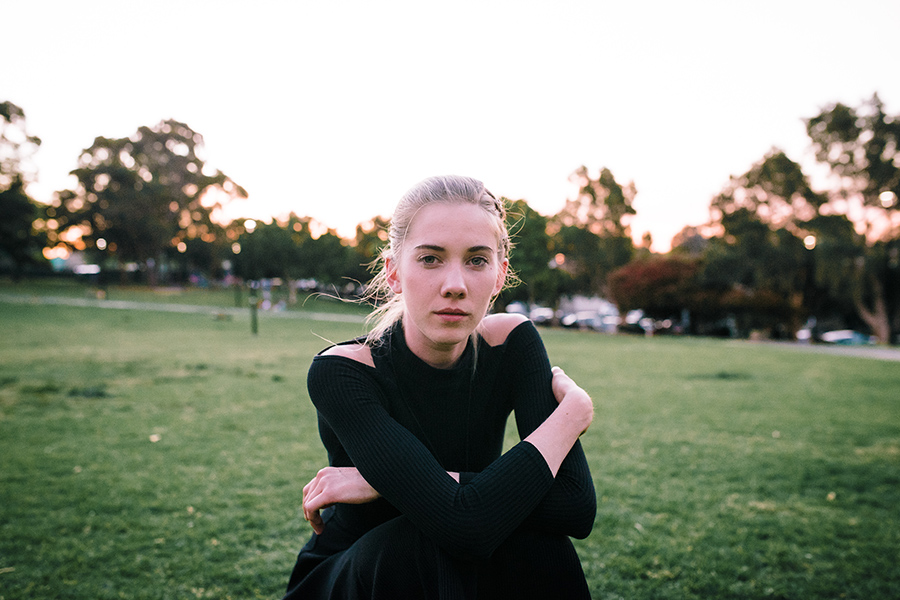
HAPPY: Would you consider making a move into that kind of music ever? Pulling a reverse James Blake?
WOODES: Experimental music?
HAPPY: Going from your more vocal led, minimalistic electronic stuff into something weirder.
WOODES: I could definitely see myself taking a turn and doing something that’s more cinematic or not even vocal, having the vocals far back in the mix. It doesn’t have to be on the radio. Something that’s beautiful, and could exist for people going to sleep. I think that’s really nice.
HAPPY: And moving forward, after the EP releases and you play your shows on the near horizon, what are you going to get up to?
WOODES: I’m working on a new EP, I’ve started on that. I’d like to have more strings, and have it build from where the current one is at. Some international travel, I’m going to the UK and the US early next year. I’ve always wanted to go to the UK, heaps of my favourite artists are there so I feel like it would be a pretty special trip. Building a live set, and adding a drummer sometime soon. Just to, you know, alleviate some pressure.
HAPPY: Well best of luck with it all. Thanks so much.
WOODES: No worries!
